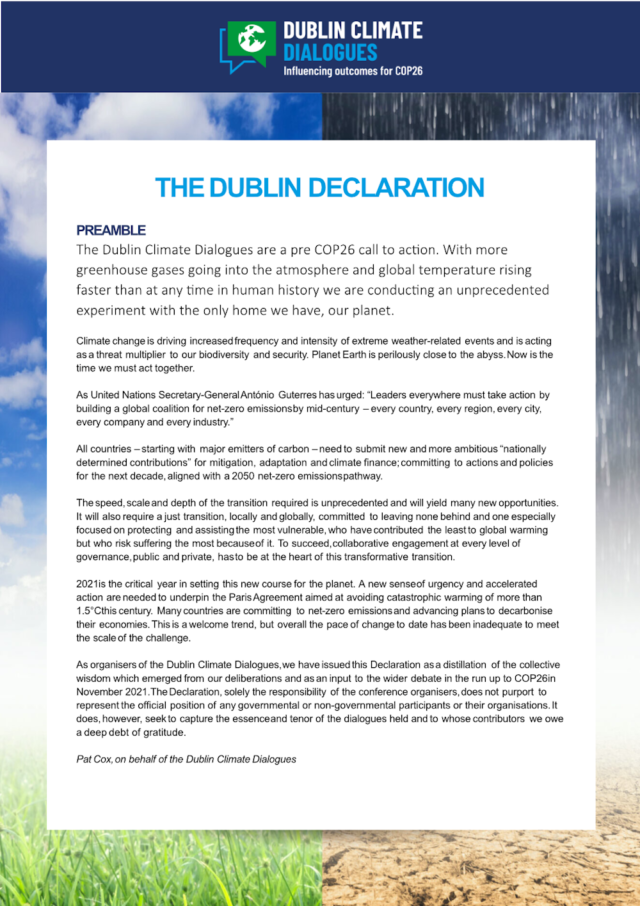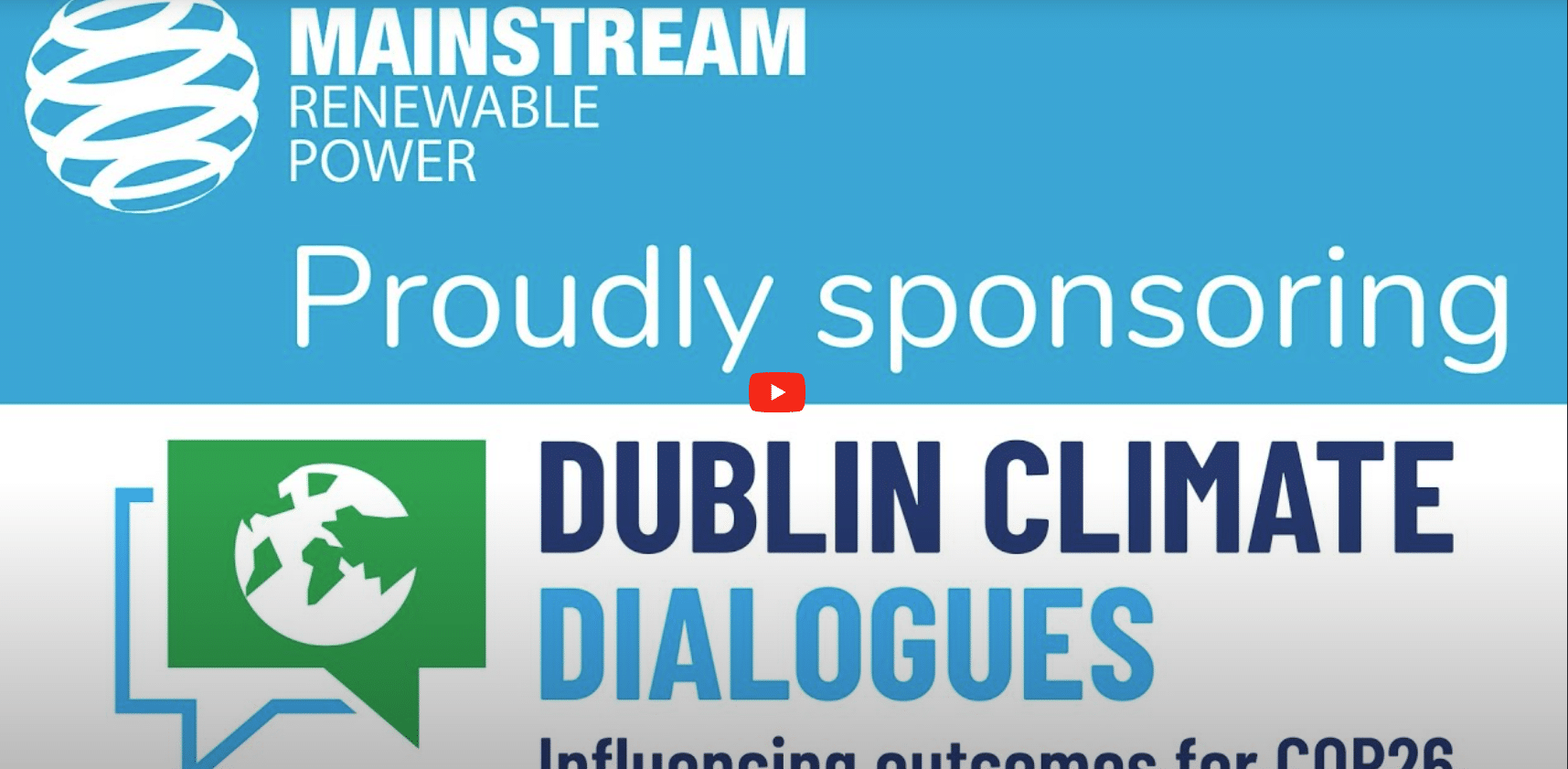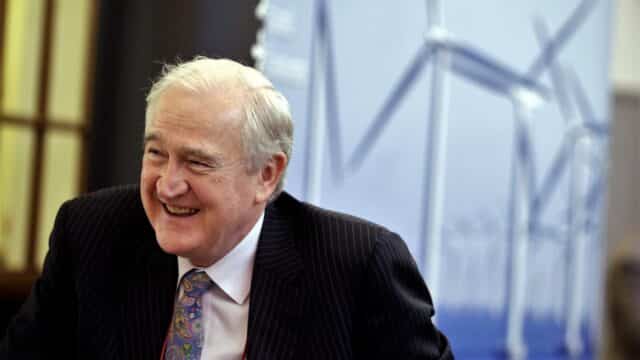Mainstream-backed Dublin Climate Dialogues issues COP26 call to action
Category
News
Date
25 May 2021
Location
Global
Dublin Climate Dialogues, the pre-COP26 think-in sponsored by Mainstream, has put forward a list of recommendations to turn net-zero pledges into concrete energy policies at the Glasgow conference this November.
The organisers’ call to action, entitled the Dublin Declaration, flowed from discussions among senior government representatives, high-profile business representatives and leading economists during the two-day virtual event.

Steering Committee member, and the former President of the European Parliament, Pat Cox, said: “The speed, scale and depth of the transition required is unprecedented and will yield many new opportunities. It will also require a just transition, locally and globally, committed to leaving none behind and one especially focused on protecting and assisting the most vulnerable, who have contributed the least to global warming but who risk suffering the most because of it.
“To succeed, collaborative engagement at every level of governance, public and private, has to be at the heart of this transformative transition.”
Urging a scaling-up of ambition to strengthen the 2015 Paris Agreement, the Declaration puts forward 12 commitments for adoption by COP26 Presidency and national delegations under the following four main themes:
FIRST
- A commitment by the participants at COP26 to the rapid electrification of the global economy including the quadrupling every year of installed renewable energy generation.
- A commitment to a just transition from fossil fuels, with a plan for every country in place by 2025 and execution through 2030.
- A commitment to eliminating fossil-fuel subsidies in every country no later than 2025. A commitment to phasing out coal power generation in every country by 2030 and natural gas power generation in that decade.
- A commitment to ending export finance for fossil fuel projects, particularly coal extraction and the building of new coal and gas fired generation. A commitment by our multilateral Institutions to the development of regulatory and funding solutions to enable the acceleration of new grid infrastructure to be the backbone of the transition to a global clean energy economy.
SECOND
- A commitment to deliver a just transition by recognising and addressing the needs of poorest and most vulnerable who have contributed the least to global warming but who risk suffering its worst effects.
THIRD
- A commitment to the rapid introduction of global reporting and accounting measures to best reflect the potential impact of climate risks to countries, communities, and companies. This includes stress-testing national and international Institutions on their response to systemic shocks to global and regional markets caused by increasingly significant climate damage.
- A commitment by the world’s multilateral financial bodies, the private sector and individual citizens to accelerate investment flows into communities that may struggle to transition from fossil fuels, coupled with a commitment to reduce the regulatory burdens on those State and non-State actors who wish to move further faster to build resilient communities powered by clean energy.
FOURTH
- A commitment to the delivery of public policy pathways that will enable countries who wish to accelerate their transition to net zero to do so, and further to enable and encourage those countries to mentor others, working with both State and non-State actors, to go further, faster.
- A commitment to enable cross-border solutions including putting a strong price on carbon, the introduction of national and international carbon price floors and other mechanisms to incentivise the acceleration of transitions from fossil fuels, whether by governments, communities, or individuals.
- A commitment to introduce border adjustments to further incentivise the transition from emissions-heavy manufacturing
The Dublin Climate Dialogues included contributions from the US Special Presidential Envoy for Climate, Senator John Kerry, Damilola Ogunbiyi, Special Representative of the UN Secretary-General For Sustainable Energy For All, and International Energy Agency Director Dr Fatih Birol.
Mainstream’s Group Chief Executive, Mary Quaney, also gave an industry perspective on the biggest challenges in delivering on climate ambitions during a wide-ranging conversation with Professor Patricia Maguire, Director of the UCD Institute for Discovery.
Having addressed the electrification of the energy system and green hydrogen’s potential to create new renewable energy superstates like Chile, she noted a positive shift in government policy making, saying: “we are seeing politicians getting bolder and more and more ambitious, and they see votes in being more proactive on climate and on energy.”
She added: “The decisions by all of the G7 nations to set mid-century Net Zero targets is a recognition that they want and we need the world to change.
“Aligned with that, I think we will see an acceleration in the decline in coal use, especially in the critical markets in Asia Pacific, and this is for two reasons: first to do with the Net Zero decisions taken by China, Japan and South Korea is the ending of export finance for new coal plant. And then secondly, as wind and solar power is now cheaper than new coal, investors are increasingly deterred by the risk of holding stranded assets.
“So the biggest challenge is no longer about other plant, like coal or gas, being built. It’s now about ensuring that we build enough renewable energy, and that we do that at scale and that we do that fast enough. Last year was a record year for the installation of wind and solar plant, but we need to double, and then treble and then quadruple this build-out, and we need to do that very quickly.”
Related News
View all News
Media Enquiries

Emmet Curley
Head of Communications and Positioning



